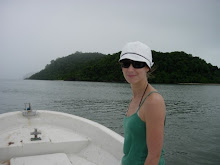When asked how blogs could be useful in a teaching context, I began to think about blogs of friends - cooks, photographers, travelers - and how they used their blogs to address certain needs in their specific contexts. Travel blogs were used to keep family and friends up to date with travels, cooking blogs helped establish a cyber-community of people who share the same passion and want to swap techniques/recipes, and journal-like blogs could be used as a tool for reflections on professional experiences.
It seems that all of the above needs are also needs of teachers. Teacher blogs can help establish cyber-communities where resources and ideas can be shared, and journeys of particular teachers that interest you can be followed. Through the actual writing of the blog, teachers are also able to consider and reflect on their practice and their own learning journey. In this way, I think blogs definitely have a place in teachers lives.
But what about the students?
As far as I can see, blogs may also provide students with a platform in which they can reflect on their own learning experiences, and share these with classmates, locally and globally. The blog may serve as a way for students to meet other students doing similar topics, etc, all over the world. The issue to be considered here, though, is privacy. Blogs pose serious risks for some students who do not wish for their identity to be made public. It would be difficult to ensure all students are writing blogs, maintaining 'netiquette' standards and ensuring all classmates identities remained anonymous.
It seems to me that blogs are a great tool for teachers, but perhaps a private forum within the classroom or school community would be more appropriate for students to use.

I have been blogging for quite a few weeks now. It is interesting to see how far I have come in what I know and understand about technology in the classroom. Initially, I did not see this 'tracking the journey' aspect of blogs to be so significant. However, now I see that this can really empower students as they track their progress, and see 'hey, I have learned something! How did I get here?' The reflection process gives students a chance to celebrate achievements, and analyse any errors in judgement that they may have had at the start. Then, they can become aware of the ways they discovered knowledge. Was it the 'relating' aspect of the journey, where they collaborated with peers on-line to come to see something in a new way? (Yes!) Was it the 'creating' part of the journey where the reflective and self-directed process led you to new understandings, individual to your journey? (Yes!) Was it the 'donate' stage of the journey, where having an 'outside customer' affected the learning, and quality of thinking? (Yes!) For me, it is clear that the blog fits perfectly with all stages of the Engagement Theory (Kearsley & Schneiderman, 1998), with each principle contributing to the quality, authenticity and depth of knowledge gained in the experience of blogging.
ReplyDeleteWHAT I LOVE ABOUT BLOGS:
ReplyDelete* 24 hour access to the reflective space (work whenever it suits you)
* Anonymity
* Constructivist
* Aligns with Engagement Theory (Kearsley & Schneiderman, 1998)
* Platform to express ideas using a number of text types (movies, text, images etc)
* Larger audience encourages students to present quality work
* Able to see process of learning easily throughout postings
* Encourages individual expression and creativity
* LM can post comments to guide student learning
* Promotes diversity and differing opinions
* Student directed learning (they learn what they want to learn, when they want to learn, and at the depth that is individual to their learning and experiences)
* Easy to use
* Networking